Key Facts About Mesothelioma in 60 Seconds
Mesothelioma is an aggressive cancer caused by asbestos exposure. These Mesothelioma facts will help you better understand symptoms, treatment, and support options.
Mesothelioma is a rare but serious cancer that occurs in the thin tissue that lines organs, affecting fewer than 3,000 people per year. This cancer develops slowly over decades and, as a result, is frequently diagnosed at an advanced stage.
Understanding some essential mesothelioma facts will help you make informed decisions about treatment and potential financial support.
Key Facts About Mesothelioma
We’ll give you some essential facts on points of exposure, common symptoms, and what to expect from this disease moving forward to help you navigate a mesothelioma diagnosis with clarity and confidence.
What Causes Mesothelioma?
The primary cause of mesothelioma is long-term and repeated exposure to asbestos.
What Are the Symptoms of Mesothelioma?
Mesothelioma patients report a range of symptoms before diagnosis. The most common ones include:
- Shortness of breath
- Chest pain
- Abdominal pain
- Extreme fatigue
- Unexplained weight loss or fever
Patients may experience additional, localized symptoms
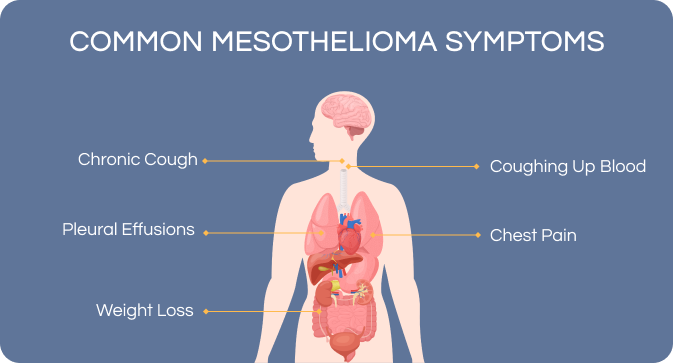
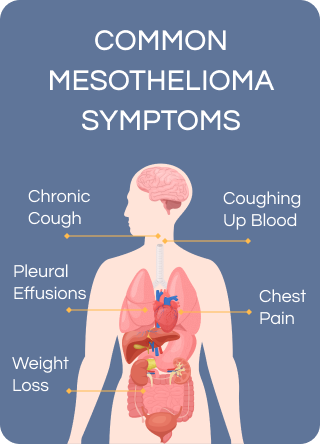
How Long Does Mesothelioma Take To Develop?
Mesothelioma has a decades-long latency period. Depending on the type of mesothelioma, it could take 10 to 50 years to develop.
Mesothelioma Latency Period by Gender


How Is Mesothelioma Diagnosed?
Initially, doctors will use imaging to determine the cause of your presenting symptoms. However, a mesothelioma diagnosis can only be confirmed through a biopsy. Additional imaging may be necessary to discover the extent of the cancer.
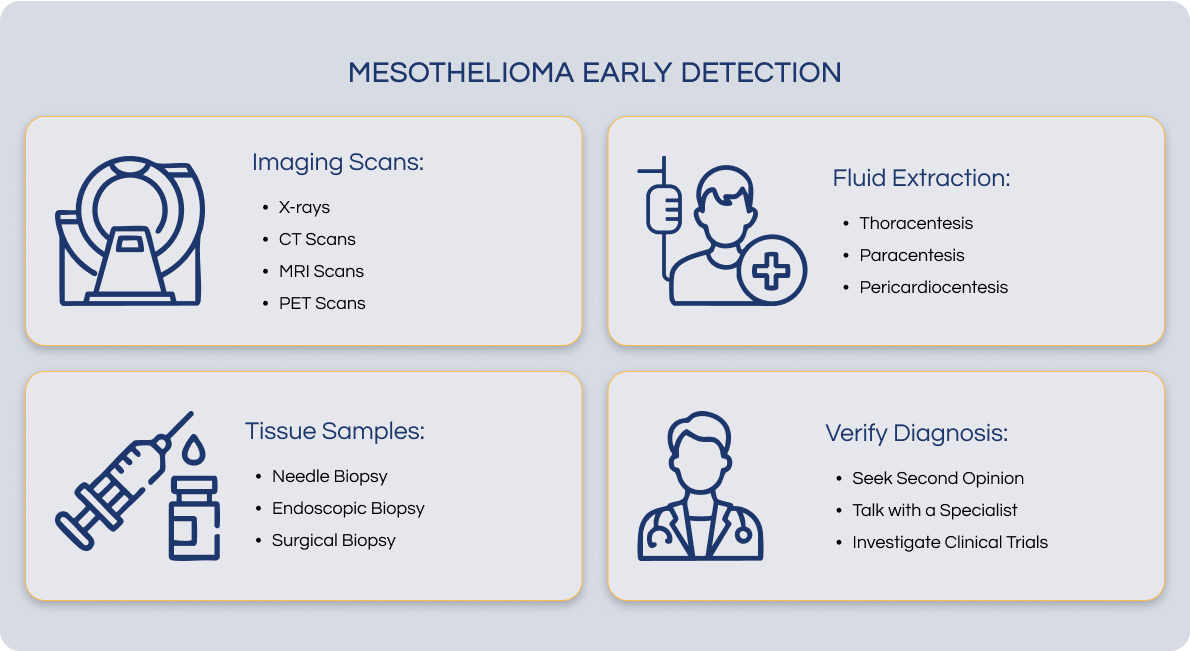

What Are My Treatment Options?
Your specific treatment plan will vary, subject to the type of mesothelioma you have and how early your diagnosis was made.
Mesothelioma treatment may include surgery. Chemotherapy and, less commonly, targeted Immunotherapy can also be used to shrink or slow the cancer’s growth and reduce your symptoms.
Prognosis and Factors
The average life expectancy of someone with mesothelioma is 12 to 21 months. However, different types of mesothelioma, the patient’s age, and the stage at which it was diagnosed all impact the prognosis.
For example, a younger person with a stage one diagnosis of Peritoneal Mesothelioma may have a higher chance of a five-year survival rate or longer.
How Does Mesothelioma Affect Your Body?
Mesothelioma most commonly affects the body by causing inflammation in the lining of your lungs. However, other organs can be affected.
In response to the inflammation, your body produces a fluid called exudate to heal the damaged tissue. Because the tissue can’t be healed, the fluid builds up in the lining of your lungs, causing shortness of breath and chest pain.
The cancer can also spread to nearby organs, surrounding tissues, and lymph nodes, which will produce separate mesothelioma symptoms.
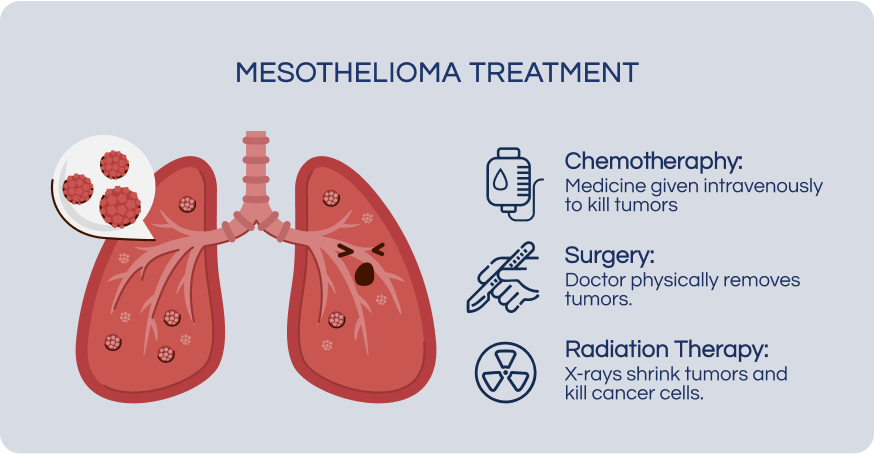
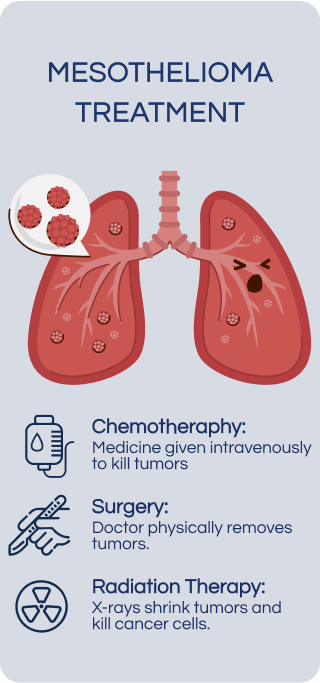
Who Is at Risk for Developing Mesothelioma?
Asbestos is a naturally occurring mineral known for its thermal properties—it’s excellent at heat retention and fire resistance. As a result, asbestos was widely used throughout the 20th century in everything from manufacturing to home insulation.
Another characteristic of asbestos is that its delicate fibers are easily airborne when disturbed. This attribute, when paired with asbestos’s extensive utilization, led to many being exposed at home, work, and school.
Senior Citizens
The average age of diagnosis is 72 years, making senior citizens the most common mesothelioma patients. This is due to both the ubiquity of asbestos in past decades and mesothelioma’s long latency period.
Occupational Exposure
More than half of all mesothelioma cases can be traced to exposure on the job. Historically, some industries have had a higher risk of exposure than others—these include:
- Industrial and construction workers
- Firefighters
- Oil refinery workers
- Mechanics
- Machine operators
Veterans & Military Personnel
The military routinely used asbestos in the insulation and fireproofing of its ships, buildings, and vehicles. As a result, Veterans and members of the military, especially those who served in the Navy, have an increased risk of exposure, especially those who worked below deck on naval ships near boilers and furnaces.
Secondary Exposure
Due to asbestos’ easily dispersed fibers, family members of exposed workers may have faced secondary exposure through contaminated clothing, hair, or gear.
Other Risk Factors
Studies of recent diagnoses have found that occupational and environmental exposure could not account for all cases. Researchers have since found other risk factors at play. One example is a genetic mutation called heterozygous germline BAP1 pathogenic mutations.
Resources and Support
There is help available for you and your loved ones that includes medical support, legal guidance, advocacy, and more.
Doctors and Cancer Centers
After your diagnosis, seek care with trusted doctors with expertise in mesothelioma. This is the best way to ensure you receive treatment that is tailored to you.
Whenever possible, working with a local treatment center is ideal. You can avoid undue stress if you don’t have to uproot your and your family’s lives during an already trying time.
Support Groups
Although mesothelioma is rare, you are not alone. Some groups offer support to the diagnosed, and others to their families. Attending a support group can give you a place to share common experiences and inspire hope.
Financial Support
If you or a loved one is facing a mesothelioma diagnosis, you may be owed financial compensation. Pursuing compensation through a trust fund is a common avenue. Alternatively, you may have a legal claim.

